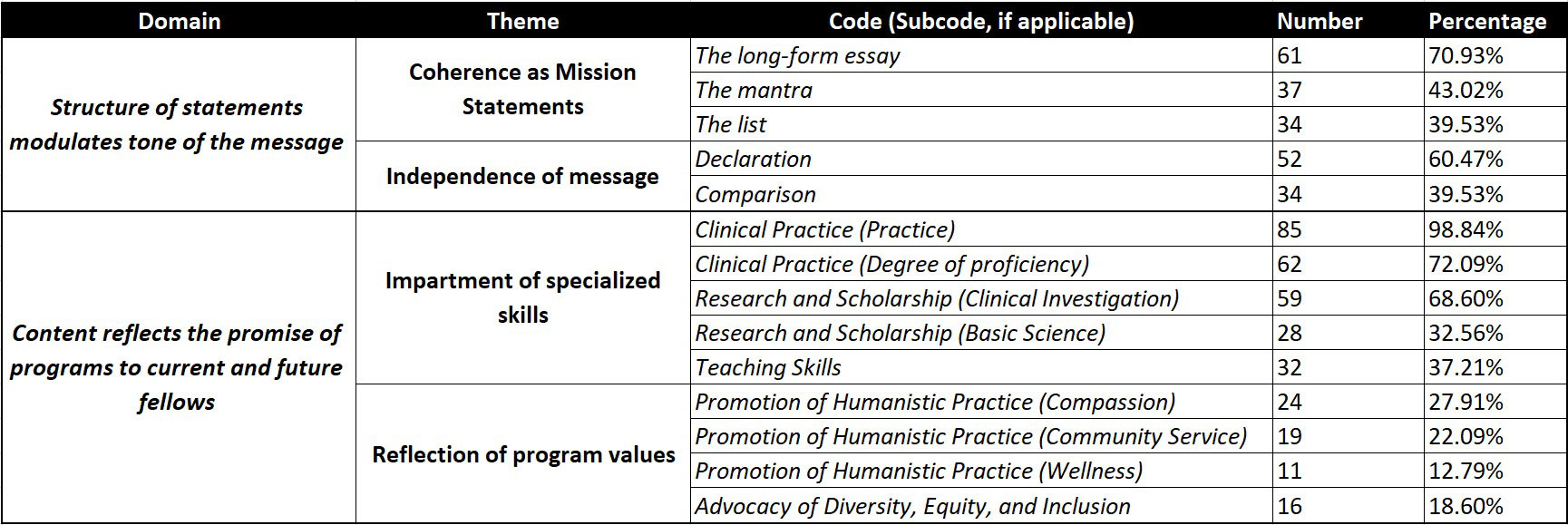Session Information
Session Type: Poster Session A
Session Time: 1:00PM-3:00PM
Background/Purpose: A mission statement is an action-oriented statement that declares the purpose of an organization and how it serves its customers. Over the past decades, mission statements have been adopted by graduate medical education programs, including adult rheumatology fellowship programs, as a means to clarify program goals and visions, as well as to attract potential applicants. The investigators use a two-phase mixed-methods approach to characterize these mission statements in order to identify the principles and values emphasized across rheumatology training programs.
Methods: A multi-institutional group of investigators from different stages of training, from medical student to program director, was assembled to ensure diversity of voices. The group designed a sequential mixed-methods study that first used qualitative techniques to identify themes and then followed up with quantitative methods to determine the frequency of such themes. The sole inclusion criterion was listing in the Association of American College’s Electronic Residency Application Service Database. Through internet searches via Google, mission statements for each program were collated into Microsoft Excel.
First, as part of a grounded theory approach, the investigators utilized constant comparison for open coding, followed by selective coding and axial coding to determine codes, themes, and domains until reaching thematic saturation. Secondly, these codes were applied to each of the programs. Descriptive statistics were then employed to determine the frequencies among the entire set of fellowship programs.
Results: Among the 126 adult rheumatology fellowship training programs, 86 (68.3%) had mission statements posted on their websites. These were included for further qualitative and quantitative analysis. 27 codes, 4 themes, and 2 domains emerged. The 2 overarching domains included “Structure of statements modulates tone of the message” and “Content reflects the promise of programs to current and future fellows.” Within the “Structure” domain, investigators characterized two themes: “Coherence as mission statements,” (with three codes: the long-form essay, the mantra and the list), and “Independence of message,” (with two codes: declarations and comparisons). Likewise, within the “Content” domain, there were two themes:”Impartment of specialized skills” (Clinical, Research, and Teaching Skills) and “Reflection of program values” (Links to belief systems, Advocacy of diversity, equity, and inclusion [DEI], and Promotion of humanistic practice)
These codes were then applied to the 86 available programs. The majority (61 [70.9%]) were long-form essays composed of three or more sentences. 52 (60.4%) were declarations while 37 were comparators. 85 (98.8%), 78 (90.6%), and 32 (23.2%) mentioned clinical practice, research, and teaching skills, respectively. 16 (18.6%) and 35 (40.7%) addressed advocacy of DEI and humanistic practice, respectively.
Conclusion: Our analysis of rheumatology fellowship mission statements indicates that programs focus heavily on clinical practice and research. Advocacy of DEI and humanistic practice (including wellness, compassion, and community service) remains under-represented.
To cite this abstract in AMA style:
Kournoutas I, Feng A, Wiemer N, Zahn C, Lucke M, Kumar B. Rheumatology Fellowship Programs – What Are Our Missions and What Are We Missing? A Mixed Methods Analysis of Publically-Available Mission Statements from the 126 Adult Rheumatology Fellowships in the United States [abstract]. Arthritis Rheumatol. 2022; 74 (suppl 9). https://acrabstracts.org/abstract/rheumatology-fellowship-programs-what-are-our-missions-and-what-are-we-missing-a-mixed-methods-analysis-of-publically-available-mission-statements-from-the-126-adult-rheumatology-fellowships-in-the/. Accessed .« Back to ACR Convergence 2022
ACR Meeting Abstracts - https://acrabstracts.org/abstract/rheumatology-fellowship-programs-what-are-our-missions-and-what-are-we-missing-a-mixed-methods-analysis-of-publically-available-mission-statements-from-the-126-adult-rheumatology-fellowships-in-the/

